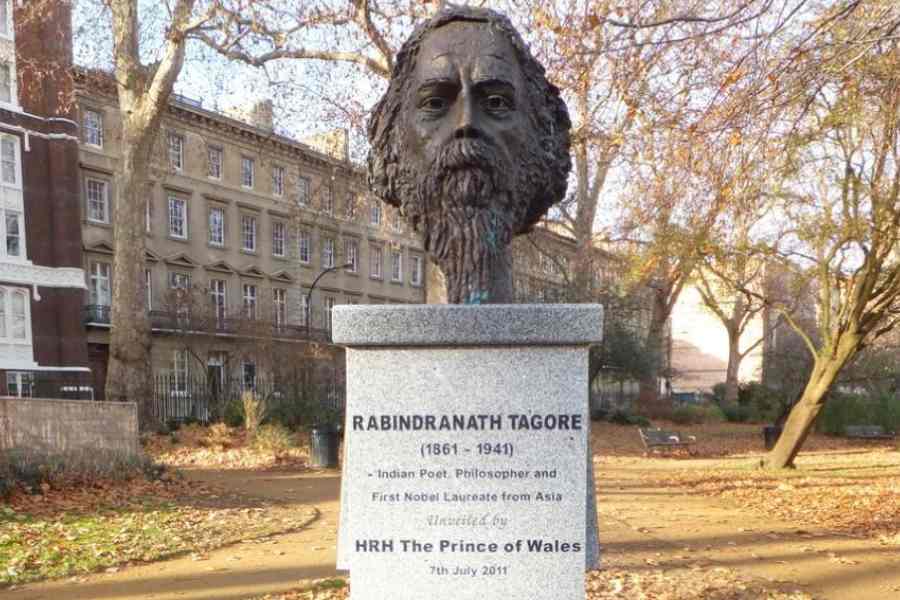Poetic link
King Charles III likes poetry by Rabindranath Tagore, I learnt from Professor Bashabi Fraser, who happened to be in London during the coronation. She and her husband, Neil, managed to visit the villa in the Vale of Hampstead which carries a Blue Plaque to commemorate Tagore’s stay in the property in 1912, the year before the poet won the Nobel Prize for Literature. Bashabi, who has been the director of the Scottish Centre of Tagore Studies at Edinburgh Napier University, said that when Charles III presented her with a CBE at Windsor Castle in January 2021, “he had obviously done his homework. He said, ‘So you have done a lot of work on Tagore?’ He told me he liked reading Tagore. When I said, ‘You unveiled the bust of Tagore at Gordon Square in London [in 2011],’ he smiled and said, ‘I did.’”
She hopes the King will unveil the Tagore bust planned for Edinburgh.
To play or not to play
For Indians coming to London for the summer, I offer a little tip. They should try and catch The Motive and the Cue, a new play at the National Theatre, before the run ends on July 15. Directed by Sam Mendes, The Motive and the Cue is based on the events of 1964 when the great Shakespearean actor, Sir John Gielgud, directed Richard Burton in a Broadway production of Hamlet. Burton, who was then 38, had just married the 32-year-old Elizabeth Taylor. In a battle between two theatrical giants, Gielgud and Burton repeatedly clashed over how Hamlet should be played.
When Burton is wondering if he has been miscast, Taylor, who had four previous husbands, reassures him: “Of course, you can play Hamlet. You can play anything. You’re the finest actor I ever went to bed with.” The production, referred to as Burton’s Hamlet, proved to be a triumph. It opened on April 9, 1964, at the Lunt-Fontanne Theatre in New York and played to packed houses for 137 performances before closing on August 8, 1964.
Spirit of service
After Charles and Camilla were crowned King and Queen Consort, I spoke to a number of Indians as they filed out of Westminster Abbey, among them Lord Jitesh Gadhia, chairman of the British Asian Trust, and Malcolm Deboo, president of the Zoroastrian Trust Funds of Europe.
Gadhia, who is close to the King, told me: “India and Indians can relate to this weekend’s coronation in multiple ways. He first visited India in 1975 and has made nine official trips to the country [I was on the one he made when he was married to Diana]. Indian culture and scriptures are rich in narratives about the ideal qualities and virtues of a King. This golden thread of seva or selfless service was woven throughout the proceedings — a theme which will resonate with Indians from all backgrounds.”
Deboo commented: “And now we have a Hindu as prime minister. Britain has come a long way even since 1953. And I can say today I am proud to be British.”
Kind patronage
Cambridge University started its journey over 800 years ago, but this is the first time that an entire building has been named after an Indian. This is the 4-storey Yusuf Hamied Court at Christ’s College where the chairman of the Indian pharma giant, Cipla, was an undergraduate and PhD student between 1954 and 1960.
The grand opening of the building was presided over by the Master of Christ’s, Lord Simon McDonald, who showed guests relics of famous old boys at the College — poet John Milton’s mulberry bush, the statue of a young Charles Darwin and a bust of Jagadish Chandra Bose. Those attending included some 25 eminent scientists, including the Nobel laureate, Sir Venkatraman Ramakrishnan, a former president of the Royal Society, the wife of the novelist, Jeffrey Archer, Dame Mary Archer, and the Indian high commissioner, Vikram Doraiswami. The new building was funded by the charitable foundation set up by Hamied and his wife, Farida.
The mathematician, Frank Kelly, a former Master of Christ’s, said that Hamied’s generosity had helped to boost the number of postgraduates at Christ’s from 70 in 2007 to 270 currently and added: “We should acknowledge with gratitude the truly transformative effect Yusuf has had on Christ’s College in the 21st century.”
Hamied, who is funding visits to India by Cambridge scientists, said: “My family’s association with Cambridge University dates back to 1870, when a granduncle of mine, Justice Syed Mahmood, studied here at Christ’s College. His family founded the Aligarh Muslim University.”
He fondly remembered the Cambridge don and Nobel Laureate, Lord Alexander Todd, who had admitted him without A levels after a chance meeting in Bombay when he was 17: “Little did I imagine at that time that 69 years later, I would be standing here in my beloved College in front of this august audience at the inauguration of the Yusuf Hamied Court connected to the Todd building, where the spirit of education and benevolence are linked together for eternity.”










